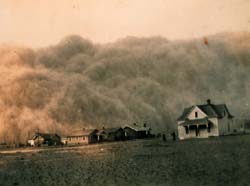An international team of scientists has discovered new carbon-bearing particles, which they call “tar balls,” in air pollution over Hungary, the Indian Ocean, and southern Africa. Tar balls form in smoke from wood fires and agricultural and forest burning. Carbon-bearing particles like tar balls in the lower atmosphere are a concern, they say, because they may affect global climate change, as well as air quality.
The team, headed by Mihály Pósfai, an Earth and environmental science professo

NASA scientists have an explanation for one of the worst climatic events in the history of the United States, the “Dust Bowl” drought, which devastated the Great Plains and all but dried up an already depressed American economy in the 1930’s.
Siegfried Schubert of NASA’s Goddard Space Flight Center, Greenbelt, Md., and colleagues used a computer model developed with modern-era satellite data to look at the climate over the past 100 years. The study found cooler than normal tropical
Today at the “Solar platform” test site in Almeria (Spain) the European Commission presented the state of play on its research programmes in alternative energy sources, including solar thermal, wave and geothermal energy. World energy consumption will double over the next 50 years, with Europe currently depending heavily on foreign energy sources. Currently, 41% of EU energy consumption is based on oil, followed by gas (23%), coal (15%), nuclear (15%) and only 6% is based on renewable energies. The t
For species such as corals the dispersal of their larvae and restocking of damaged reefs is critical to their ability to survive the changes produced by global warming.
In the latest issue of Ecology Letters, David Ayre and Terry Hughes from the Australia’s Wollongong and James Cook Universities have for the first time used genetic data to show that individual coral reefs within the world’s largest tropical reef system (the Great Barrier Reef) must be buffered against such change
An international team of geoscientists believes that carbon dioxide, and not changes in cosmic ray intensity, was the factor controlling ancient global temperatures. The new findings resulted from the researchers inclusion of the ocean’s changing acidity in their calculations.
“Reviewing the geologic records of carbon dioxide and glaciations, we found that carbon dioxide was low during periods of long-lived and widespread continental glaciations and high during other, warmer periods,” s
A chemical once used in pesticides in Asia has accumulated thousands of miles away in Canada, according to a University of Toronto study.
High concentrations of alpha-hexachlorocyclohexane (HCH) were detected in the atmosphere of Sable Island off the coast of Nova Scotia and Newfoundland, says Professor Frank Wania of chemistry. The chemical was last used about 15 years ago in countries such as China and India but followed atmospheric and water flows across the Pacific, Arctic and Atl